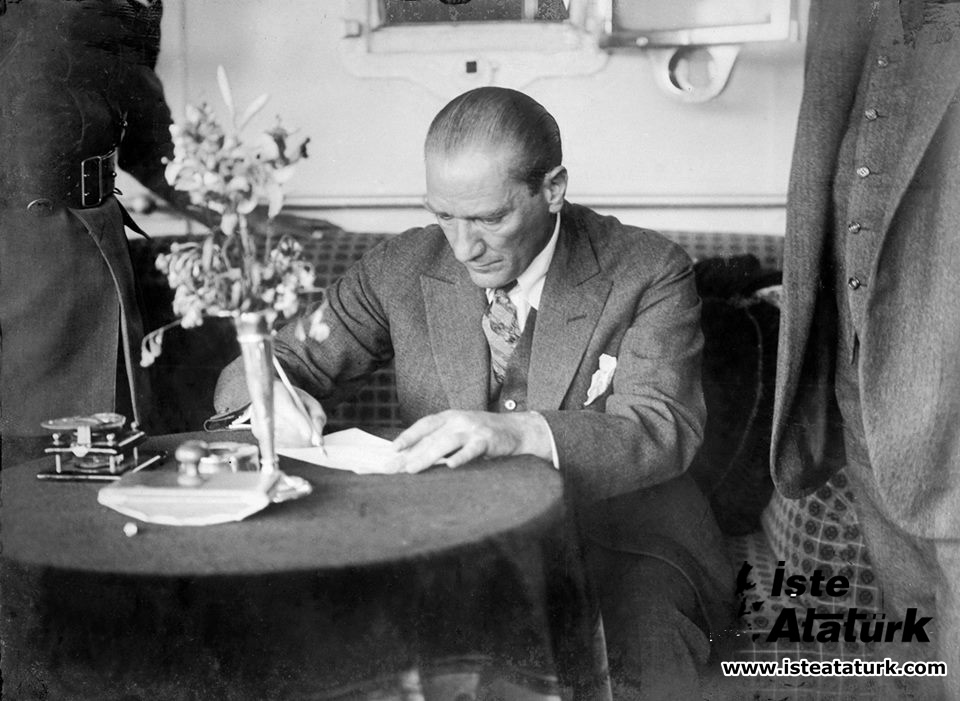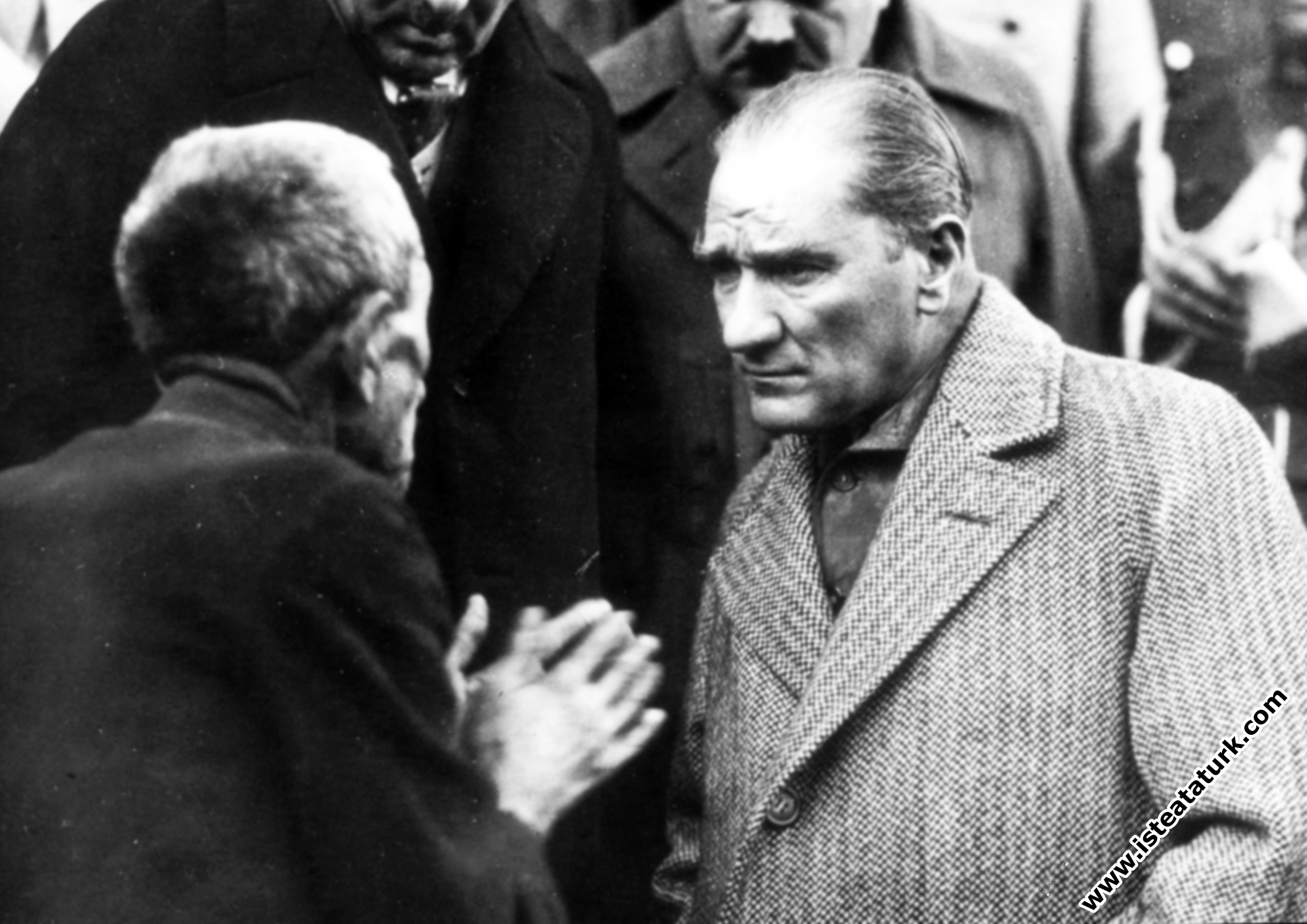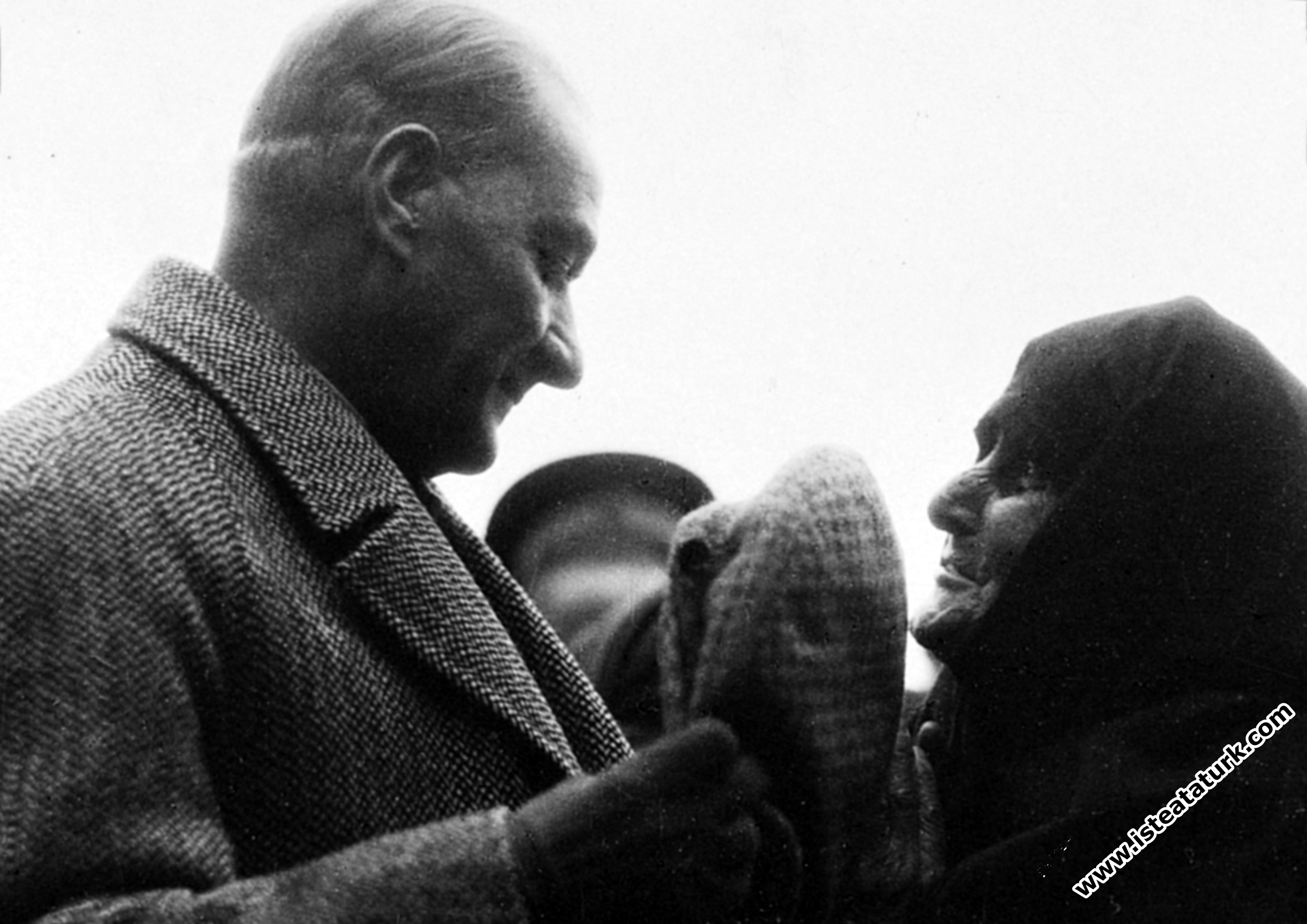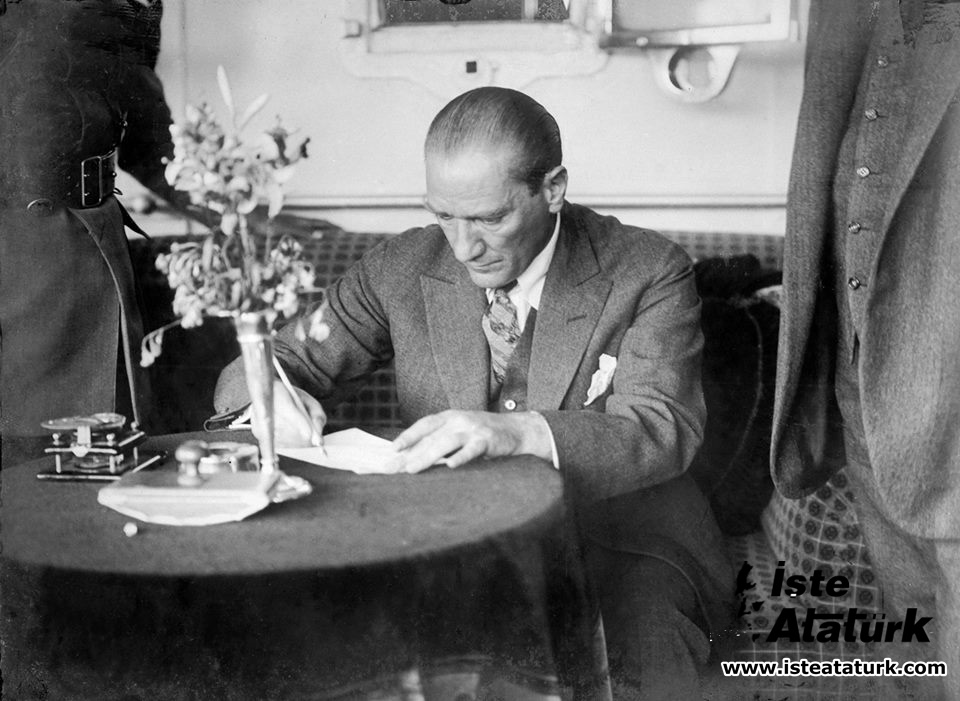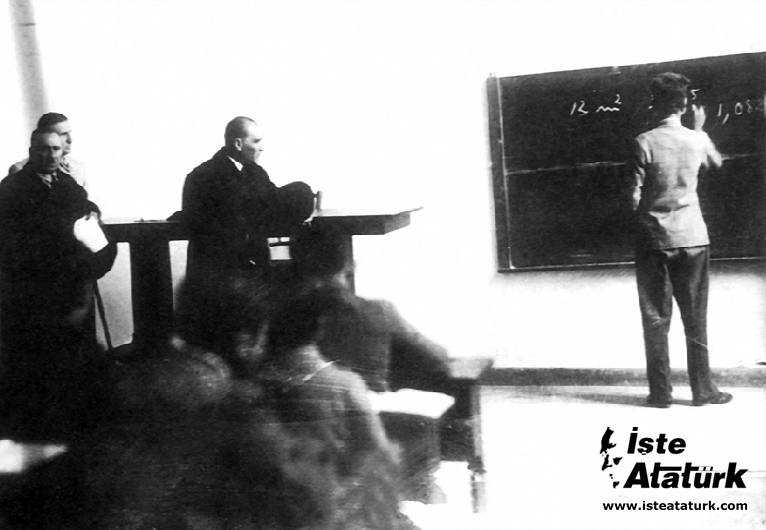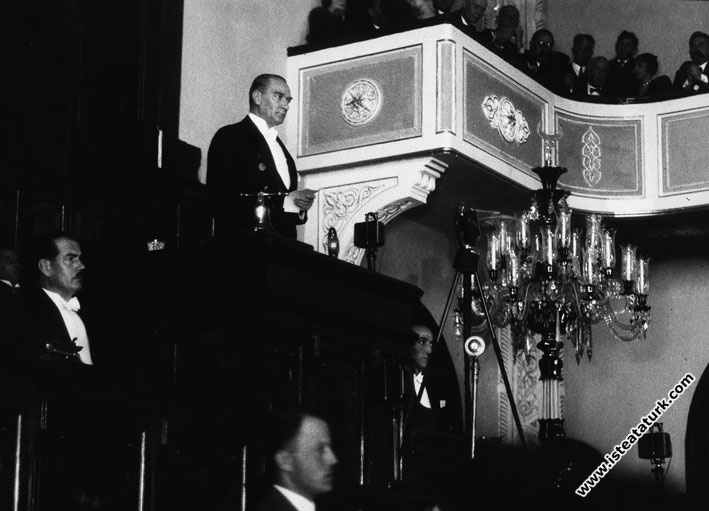
The Principle of Secularism of the Atatürk Republic
Character Size
“For everything in the world; For civilization, for life, for success, the most true guide is science, science, seeking a guide other than science is heedlessness, ignorance, and indication." Mustafa Kemal Atatürk
ATATURK'S REPUBLIC OF SEALIC PRINCIPLE
In our opinion, the quality that will best characterize the Atatürk Republic is its secular nature. Because if secularism is not realized and is not respected continuously and meticulously, the existence of the democratic and independent national republic, which was the target of the Kemalist revolution, will be endangered, as well as the effort to modernize Turkish society, which is another goal, will fail and our society will again be plunged into the darkness of the Middle Ages.
The constant stirrings of the religious movements of thought and the sharia and reactionary propaganda, and the "Communism and Bigotry hand in hand" tactic that international communism wants to apply to Turkey, or to put it more accurately: The strategy of infecting the village and nation with bigotry, protecting the Republic. It requires every patriot tasked with the task to be more vigilant than ever before.
For this reason, we would like to dwell on the issue of the secular republic and emphasize the importance of preventing the "abuse of religion", which is a chronic disease of our country, especially in terms of politics. As it is known, secularism is a result of freedom of mind and conscience, like personality, freedom and equality in the western understanding of democracy. In that case, the fact that religion and the state do not exert any pressure on reason and conscience, that reason and conscience, in short, that society and the state should not be under the command of religion, was understood in the New Age, not in the First and Middle Ages.
However, although the principle of separation of religion and state has been gradually applied in the West for centuries, the theocratic form of state, which combines state, society and religion, was applied in the Ottoman Empire as it is practiced in Saudi Arabia today.
This theocracy system, especially in the period of decline and collapse of the Empire, became a total black bigotry, and this bigotry degenerated the essentially liberal nature of the Islamic religion, on the one hand, corrupting the state structure, on the other hand, closing Turkish society to western civilization tightly, turning our country into a backward medieval society. He resisted to keep it and became the chief responsible for the decline and collapse of the Ottoman Empire.
It is known that the movement to open up and turn to the west, which was prepared after the Tanzimat, could not achieve a modernization in the structure of the state and society, and that the attempts made could not exceed the level of "administration-i maslahat" and "imitation".
It is certain that the rationalism and scientific nature of the Kemalist worldview will lead Atatürk to found a society and state in the western sense based on reason and science. This is what the secular Republic is about. However, it should not be forgotten that various stages have been passed in the march towards the goal of secularism. The first of these stages was the abolition of the caliphate on March 3, 1924, after the abolition of the sultanate, which was the basis of the theocratic state, in 1922 and the proclamation of our Republic, which was based on national sovereignty instead, on October 29, 1923.
With the abolition of the caliphate, on the one hand, the foundations of the Republic were consolidated, and on the other hand, a bold breakthrough was made towards the realization of a secular and modern society. The elimination of the provisions regarding state religion in the Constitution and the clear acceptance of the principle of secularism are the normal results of this development.
Closing the lodges and zawiyas, which are the home of the reactionary mentality that endangered the existence of the state and hindered the rationalism and modernization movement, and banning the sects were another important step in terms of secularism.
As Atatürk said: “None of us need the guidance of the dervish lodges. We get strength from civilization, science and science, we don't know anything else. The purpose of the lodges is to make the people insane and stupid. However, the people have decided not to be crazy and stupid. On the path of civilization, Turkey cannot be the land of sheikhs and dervishes”. As a matter of fact, with the law dated 30 November 1924, all dervish lodges and zaviyes were closed and all sects were banned.
The fact that the religion of Islam differs significantly from Christianity further increases the importance of secularism in Turkey and provides it with a characteristic. Namely, the Christian religion claimed only a spiritual and spiritual sovereignty, and declared that it had nothing to do with the world, that is, with material and corporal sovereignty. However, the religion of Islam encompasses all the rules regarding the world and the hereafter; religion and state mixed and fused with each other. This feature of the religion of Islam makes it impossible to separate religion and state. This mixing and fusion was not harmful when the liberalism of the religion of Islam was followed, but over time it became the main factor of the decline against the "West" for all Islamic countries.
For this reason, the establishment of secularism in our country is an effort to separate and save world institutions and relations from religion, which is mixed and fused with them, rather than regulating religion and world relations as in Western countries. Yes, there is no society without religion. However, the history of the Ottoman Empire and the Republic shows with countless examples that leaving the religious life empty and leaving the people to the claws of black bigotry led to terrible betrayals in the name of religion. Kabakçı Mustafa Revolt, 31 March Incident, Konya Revolt in the National Struggle, Sheikh Said Uprising, Kubilay Disaster in Menemen and Said-i Nursi events, and finally Kahraman Maraş at the end of 1978 are just a few examples.
That is why, with the 19th article of the 1961 Constitution, while guaranteeing the freedom of conscience and religion, on the other hand, it prevented the abuse of these freedoms. “No one can exploit and abuse religion or religious feelings or things considered sacred by religion, for the purpose of basing the social, economic and legal basic order of the state, even partially, on religious rules, or for the purpose of gaining political or personal interest or influence. The provisions of the law shall apply to real and legal persons who violate this prohibition or provoke others in this way, and political parties are permanently dissolved by the Constitutional Court”. As a matter of fact, after the military's intervention on March 12, the National Order Party in our country was dissolved by the Constitutional Court based on this article.
As a matter of fact, a similar provision was also included in Article 24 of the 1982 Constitution: cannot abuse or abuse religion or religious feelings or things considered sacred by religion.”
Sadi Irmak, in his book titled History of Atatürk Revolutions, published in recent years, explains very well, in our opinion, the main reason for the decline of the Ottoman Empire and why the Turkish Revolution was necessary. According to the author, until the end of the 16th century, the Ottoman Empire became the most powerful and magnificent state, thanks to the national dynamism fueled by the power of faith, a superior war technique, advanced prosperity and organization. The legal era constitutes the pinnacle of this splendor. Unfortunately, despite this outward majesty, the seeds of our backwardness were planted in this period. Because the world was entering a new economic order, a new mentality was being born. So, a new world was born. The Ottoman Empire could not keep up with this innovation. This is the deep reason why we lag behind and then we are compelled to make revolutions. According to Mr. Irmak, three major technical innovations that closed and opened an era in Europe; It was the development of the compass, the use of gunpowder in cannons, and the dissemination of information to large masses, especially with the invention of the printing press. The Western seafaring and colonial policies had poured world wealth at their feet.
The Ottoman Empire, on the other hand, did not participate in this new movement, but only pursued conquests. The Turks, who were the main element of the empire, were carrying the burden of conquest with their wealth and lives and were getting poorer. The economic balance was upset against the Turks.
The main important fact mentioned by the author is this: The world was not only changing in terms of economy. In terms of ideas and mentality, too, there had been a great change. The general name of this change is humanism. Humanism is a transition from the medieval scholastic and dogmatic worldview to a view that believes in the supremacy of reason.
The first work of humanism is the Renaissance. The Renaissance movement, which is the rebirth of Europe, is the substitution of reason for scholasticism, observation and experience instead of transport, and secularism instead of theocracy. In the positive sciences, Kepler, Copernicus laid the foundations of mathematics, astronomy and physics, and Newton, who followed them, created the science of mechanics. Under the light of these sciences, human intelligence began to conquer the world and the universe step by step.
A second work of humanism is the reformation. The reason why Protestantism is a humanist movement is not only that it brings about an innovation in the field of religion, but also that it breaks the narrow circle of the church in every subject, including religious issues, and accepts that the method of criticism can be applied to every field.
While two humanist movements, such as the Renaissance and the Reformation, were taking place in Europe that brought light to the human mind, the Ottoman empire remained distant and foreign to these movements and entered a grave reactionary movement. In the 15th century, with the patronage of Fatih, the tendency to deal with the religion of Islam with a tolerant understanding emerged, but from the 16th century, religious bigotry had surrounded the whole country and the administration.
According to Sadi Irmak, the religion of Islam is actually a rational religion, not a dogmatic one. Especially trying to find positive sciences and chemistry in the Qur'an is not understanding this religion at all. Because positive sciences are constantly changing and being renewed. Can the Qur'an contain information that will change with the development of the human mind? If he did, would there be room for the hadith: "Go and seek knowledge, even in China"?
There is no doubt that Atatürk showed great respect to the institution of religion by accepting the revolution as a principle of conscience and morality, separating it from worldly affairs and connecting the ever-changing realities of life to positive sciences.
For this reason, secularism became the axis of the Turkish revolution. The Turkish revolution has adopted rationalism, that is, rational philosophy, which is the only creator of the Renaissance, reformation and positive sciences. In the Turkish Grand National Assembly: “Caliphate is abolished, sharia goes, shrines are closed, what will I be now?” Atatürk's answer to a teacher who asked the question is still valid today: “You will be a man, my teacher”.
As it is known, the abolition of the caliphate is one of the most important reforms of Atatürk. With this reform, the most important step towards secularism has been taken, and the path that will lead us to modern civilization, a democratic system, a secular state and social order has been completely opened, especially by overcoming this obstacle. Because the caliphate is an institution founded on the idea of the ummah. However, modern Turkey, which was founded as a result of the War of Independence waged by the Turkish nation under the leadership of Atatürk, will rise on the foundations of "nationalism".
Indeed, since the 19th century, we see that the nationalist movement has swept the whole world, yet the Ottoman Empire continued to attach importance to the caliphate. It was ignored that the ideas of nationality were getting stronger and widespread among non-Turkish Islamic communities, especially Arabs, and they were dragged into the adventure of Pan-Islamism, which consisted of the dream of uniting all Islams under one administration. The “jihad” declared by the Ottoman Sultan and Caliph was ignored, and in the First World War, Muslims united with the Entente Powers and used weapons against the armies of the Ottoman Empire. In addition, while Istanbul, the center of the caliphate, and many other cities of Turkey, were occupied by the Allied Forces after the Armistice of Mudros,
In the face of these facts, Atatürk wanted to abolish the caliphate and unite Turkey around a national ideal. According to him, the collapse in the Ottoman Empire had already begun 50 years after the caliphate was taken by Yavuz Sultan Selim in 1517. Atatürk understood that the caliphate had no power and meaning in today's world order; Against the declaration of the "holy Jihad" of the Ottoman caliph in the First World War, the army of the Sherif of Mecca also shot us in the back. Mahmut Esat Bozkurt, one of Atatürk's Kemalist Ministers of Justice, says in his book Atatürk Revolution: "Let's shed our blood for the honor and rise of the Turk, but not for the deserts of Yemen and the establishment of the caliphate." Despite the fact that the institution of the caliphate has completed its period and has become harmful, in the country, heedless, but there was a very strong group. Therefore, when the Sultanate was abolished in November 1922 and the last Ottoman Sultan Vahdettin escaped from his hometown by taking refuge on a British ship on 17 November 1922, the Parliament ended Vahdettin's Caliphate and Abdülmecit Efendi, the son of Sultan Abdülaziz, was elected as the Caliph. However, when the Sultanate and the Caliphate were leaving, the rights of the Caliph were not well defined, and some people inside and outside the Assembly argued that the Caliph should be given political and administrative powers. It was seen that Turkey's domestic and foreign policy could not be saved from being two-headed due to the caliphate and that the Sultanate was wanted to be continued under the cover of the caliphate.
Indeed, it is essential to give the same education and training to all members of the nation. It is known that the opposing practices of two different types of people who grew up in both madrasahs and modern schools in the past dragged our nation from depression to depression and confronted us with inextricable problems. In this respect, the Republican administration could not leave the school and the madrasa, which raise people with completely different mentalities, side by side.
For this reason, Atatürk wanted the whole nation to undergo secular education based on scientific thought. That is, minds should be free from superstitions; Our direction should be determined not by stereotyped beliefs based on legends and rumors, but by the path drawn by the mind, the realities of the nation and the benefit.
According to Atatürk: “Education is what makes the nation live as a free, independent, strong and sublime society, or it drags it into captivity and poverty”. According to Atatürk, there are more than 300 million Muslims on earth. They grow up with the education of parents and teachers and learn the way to be moral. But the truth to be revealed is that all these millions of masses of people are under the chains of captivity of this or that. Because these masses have not undergone a national education. Again, in a speech he gave to the public in Izmir on January 31, 1923, before the proclamation of the Republic, Atatürk spoke of the unity of education and training thus: “The lore of our nation and country should be one. All the children of the country, men and women, should get out of there”. In another speech he made in the Assembly in March 1923, Atatürk demanded that education and training in all lore centers must be in the same direction for the progress and advancement of our society, and he wanted the Ministry of National Education and the Ministry of National Education to unite in thought and work, but finally, there was no definite decision to ensure the unity of education. He took the step with his speech on March 1, 1924 and demanded the realization of the teaching union. Only two days after this speech, the Law of Unification of Education, dated March 3, 1924 and numbered 430, which was accepted by the Assembly, bound all scientific and educational institutions in Turkey to the Ministry of National Education. In the proposal of the law: “A nation's members can only receive an upbringing; Two kinds of people grow up in a country with two kinds of education. This, on the other hand, violates the unity of feeling, ideas and solidarity aims altogether.
After the principle of educational unity was enacted, Atatürk, speaking at the Teachers' Union Congress in Ankara on August 25, 1924, said: “Our national morality must be nourished and strengthened by civilized principles and free ideas. The Republic demands from you generations with a free mind and a free conscience”. Again, on September 22, 1924, at Samsun Commerce High School, Atatürk was calling:
“For everything in the world; For civilization, for life, for success, the most true guide is science, science, it is heedlessness, ignorance, and signification to seek a guide other than science.” Under the leadership of a great and national hero like Atatürk, it is not a matter of enacting the laws of revolution. The real problem is its adoption and implementation. Sensing the possible danger of the strengthening of outdated education in the face of secular education, the Constituent Assemblies secured the Education Union Law along with other reform laws in Article 153 of the 1961 Constitution and Article 174 of the 1982 Constitution. Just as the Dumlupınar Victory saved the unity of the homeland, it is the unity of education and secularism that saved the unity of the nation. For Atatürk, saving a Turk meant giving him freedom of mind and conscience and giving him a New Age education.
Atatürk, who wanted to make the Turkish society a member of the modern society as soon as possible, in short, wanted to modernize the Turkish nation and society, removed all the obstacles that prevented our society from living its age in a modern way. These included calendar change, the adoption of the metric system, the week's holiday and clock reform. When the idea of abandoning the azani clock (the clock set to show twelve at sunset) in the Ottoman Parliament in 1909 and accepting the average clock used by the entire civilized world, the whole Assembly was suddenly confused. The late journalist Hüseyin Cahit called the thing that caused such a tumult for the first time since the opening of the Parliamentary Assembly, the "clock fight". According to him: “They were blindfolded, beards tangled, and shouting. Inside the Assembly, the dark ages of the past, the dark of divorce, was caught in a devastating flood of bigotry. They didn't want anything against the Shari'a." However, the clock reform, which once shook the Ottoman Parliament, came out in a session in the Assembly of the Atatürk Republic era. In fact, the Law No. 697, which was accepted by the Turkish Grand National Assembly on December 26, 1925, abandoned the principle of adhan hour, accepted the modern time measure used by the whole world, and divided a day into 24 hours and started after midnight. With this was put an end to a disorder that confused both our internal and external relations and upset all economic and important affairs. On the same day, the Gregorian calendar was accepted with the Law on the Change of the Historical Place in the Calendar numbered 698, which was accepted by the Assembly. The clock reform, which once shook the Ottoman Parliament, came out in a session in the Assembly of the Atatürk Republic. In fact, the Law No. 697, which was accepted by the Turkish Grand National Assembly on December 26, 1925, abandoned the principle of adhan hour, accepted the modern time measure used by the whole world, and divided a day into 24 hours and started after midnight. With this was put an end to a disorder that confused both our internal and external relations and upset all economic and important affairs. On the same day, the Gregorian calendar was accepted with the Law on the Change of the Historical Place in the Calendar numbered 698, which was accepted by the Assembly. The clock reform, which once shook the Ottoman Parliament, came out in a session in the Assembly of the Atatürk Republic. In fact, the Law No. 697, which was accepted by the Turkish Grand National Assembly on December 26, 1925, abandoned the principle of adhan hour, accepted the modern time measure used by the whole world, and divided a day into 24 hours and started after midnight. With this was put an end to a disorder that confused both our internal and external relations and upset all economic and important affairs. On the same day, the Gregorian calendar was accepted with the Law on the Change of the Historical Place in the Calendar numbered 698, which was accepted by the Assembly. It was accepted as the modern time measure used by the whole world, and a day was divided into 24 hours and started after midnight. With this was put an end to a disorder that confused both our internal and external relations and upset all economic and important affairs. On the same day, the Gregorian calendar was accepted with the Law on the Change of the Historical Place in the Calendar numbered 698, which was accepted by the Assembly. It was accepted as the modern time measure used by the whole world, and a day was divided into 24 hours and started after midnight. With this was put an end to a disorder that confused both our internal and external relations and upset all economic and important affairs. On the same day, the Gregorian calendar was accepted with the Law on the Change of the Historical Place in the Calendar numbered 698, which was accepted by the Assembly.
As it is known, until then, we were using the Arab New Year, that is, the New Year of Hijra, in terms of the calendar. This complicates both our relations with foreign countries and the calculation of historical event times; The increase in our relations with the civilized world necessitated a union in this respect. Finally, in 1931 and with the law numbered 1782, the weight and length measurements were changed, such as cubits, okka, endaze; as well as the old units, which vary according to some regions, have been removed. With the adoption of the meter and kilo basis, which are the civilized units of measurement, based on the decimal, both commercial and economic transactions became much easier, and a complete measurement order was established all over the country. In short, with these changes, the foreign life of the Turk was ordered, The fact that the change of the external order is an important condition for the settlement in the internal order is well understood. As a matter of fact, we know that with these necessities, England had to accept the metric system a short time ago, only in the 1970s. It is an obligation arising from international relations that the week holiday is based on Saturday and Sunday and that this situation finds its expression in the law on National Holidays and General Holidays. Laicism in its broadest sense; It is the separation of religion and state affairs, all the states established in the First, Middle and New Ages were based on religion, and the rulers took their authority from religion and God. In fact, Christianity, which did not interfere in the affairs of the state, has also dominated since the Middle Ages, religious rules, stifling the freedom of thought, In the Middle Ages, which lasted for centuries, every form stopped progress. With the effect of the Renaissance and Christianity, which emerged as a reaction to this, religion began to withdraw from state affairs, but the principle of secularism became the basis of the state, and it was possible with the French Revolution of 1789. The Islamic world was left out of this development, and the enlightenment that started with the Renaissance did not enter the Islamic community. .
When Atatürk founded the new Turkish State, he planned to get rid of the religious structure of the Ottoman State, since his aim was to clear the rules that stifle development and progress from the principles of administration. In fact, it was no longer necessary for the new state within the borders of the National Pact to follow the Islamist state policy of the Ottoman Empire, which gathered Muslim people other than Turks around a single country, in short, to be religious in political terms.
In fact, the administration and legal rules of Islamism, while they were very advanced in the beginning, were not renewed with time and lost their value with the blockage of the door of ijtihad. Islamism, which accepts the principle of obeying the time; It was also obvious that it was suitable for attempts to leave the people alone with God and to withdraw the clergy and religious institutions from the state administration. To be honest, the Caliphate, which has been in the hands of the Ottomans since 1517, also has a political meaning, not a religious one. When Yavuz Selim conquered Egypt in 1517, he brought a man named Mütevekkil to Istanbul with the sacred objects known as the "Sacred Relic". The Ottoman Sultanate had nothing to do with the Caliphate, other than the presence of these sacred relics of the Islamic world in Istanbul. The most important condition of the caliphate was that the caliph should emerge from the Quraysh tribe of the Prophet. As a matter of fact, both the first four Caliphs and the Umayyad and Abbasid Caliphs were members of the Quraysh Tribe. In 1258, when Hulagu killed the last Abbasid Caliph Mutasim with his family in Baghdad, it is accepted that the caliphate really disappeared. The Shiites, on the other hand, never accepted the caliphate. Ali, the husband of his daughter Fatma, that is, his son-in-law, should have been the Caliph. For this reason, the Shiites recognized only Ali's family's right to caliphate and called them imams. Ali, the nephew of the Prophet Muhammad and also the husband, or son-in-law, of his daughter Fatima, should have been the Caliph. For this reason, the Shiites recognized only Ali's family's right to caliphate and called them imams. Ali, the nephew of the Prophet Muhammad and also the husband, or son-in-law, of his daughter Fatima, should have been the Caliph. For this reason, the Shiites recognized only Ali's family's right to caliphate and called them imams.
We see that Shi'ism was the official religion of Iran in the 16th century, and that the caliphate, a symbol respected only in the Sunni Islamic world, was not taken seriously even by the Sunni Muslims outside the Ottoman borders when the Ottoman Empire lost its power, and the Ottoman rulers remained only an Ottoman caliph. We see the most typical and sad example of this in the fact that the Holy Jihad declared by the Ottomans during the First World War could not prevent the Muslims from revolting and fighting against the Ottoman-Turkish army. In this way, it was understood that the Ottoman caliphate had actually disappeared. The legal abolition of the caliphate was also mandatory. After the Republic was proclaimed, it is both illogical and unreasonable for a member of the Ottoman family to sit next to the President in a position that does not have a religious power or function. it was also harmful to the future of the young Republic. As a matter of fact, after the abolition of the sultanate and the proclamation of the Republic, some internal and external circles gathered around the caliph Abdülmecit and tried to strengthen him politically.
As a result of all these developments, as we pointed out above, on March 3, 1924, three laws regarding the abolition of the Caliphate, the abolition of the Ministry of Seriya and Awqaf, and the Unification of Education were passed. With the Law No. 431, which abolished the caliphate, it was decided to expel all the male and female members of the Ottoman family and their grooms abroad. While all the properties of the sultans were transferred to the nation, it was decreed that the properties of the family members be liquidated within one year, otherwise the government would sell these properties and send them the price.
I believe that as the generations of the Republic cannot adequately explain Atatürk and Kemalism to the young people, just as Turkish children are divided into ideological enemy camps and killed each other by being provoked from outside, as long as we cannot adequately explain Atatürk's secular principle as "the greatest service to Islam" There is always the danger of external enemies provoking pure Muslim children against the Atatürk Republic.
Prof. Dr. İsmet Giritli *
*Former Member of Atatürk Research Center Scientific Committee
Source: ATATÜRK ARAŞTIRMA MERKEZİ DERGİSİ, Sayı 4, Cilt: II, Kasım 1985
